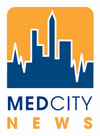
By Thomas Lee
In the not-too-distant-future, Dr. Jim Woodburn says, patients can reach their doctors on the phone.
If that doesn’t sound too impressive, consider this: the doctor can literally see the patient, access medical histories, listen to heart beats, and check the eyes, ears, nose, and throat- all from the other side of the country.
“Telemedicine is going to be as common as the telephone,” said Woodburn, the former chief medical officer of MinuteClinic who now oversees UnitedHealth Group Inc.’s (NYSE:UNH) ambitious effort to build the first national telemedicine network.
Long touted by experts as a way to cut costs and expand patient access to doctors, remote medicine is increasingly drawing the interest of medical, software and telecommunications companies. The market for health-related mobile services and devices will hit nearly $2 billion by 2013, according to a report by law firm Pike & Fischer.
Datamonitor, a provider of online database and analysis services, forecasts that annual spending on telehealth hardware, software and related services will nearly triple over the next three years, from the current $2.4 billion to $6.1 billion in 2012.
“Mobile technology is proving to be a major cost and time saver in the medical environment, and as a result, represents a significant evolutionary step in the field of modern medical treatment and preventive care,” Pike & Fischer said. ” This technology allows specialists to triage, diagnose and monitor remote medical cases by viewing data and images conveyed wirelessly to their location.”
WellPoint Inc. recently said it will offer its members access to doctors via the Internet and text messaging. Last year, Verizon Communications said it will launch an online physician video chat service called Telehealth Collaboration.
Earlier this month, Delta Airlines said it will become the first company in the United States to use its UnitedHealth’s NowClinic program. The service, initially available to 10,000 employees in Minnesota, allows workers to access doctors through the Internet 24 hours a day, seven days a week.
Given the falling price of technology and federal stimulus funding for super fast broadband networks, UnitedHealth decided in 2009 to pay for telemedicine services.
“Last year really accelerated the development of telemedicine,” said Wooburn, vice president of clinical initiatives at UnitedHealth’s OptumHealth unit. “We seized that opportunity.”
UnitedHealth is partnering with Cisco Technologies to develop Connected Care, the first national telemedicine network. Using homemade software and Cisco video conferencing equipment, the company, the nation’s largest private insurer, hopes to use its size and scale to sell doctor groups and employers its telemedicine technology and services.
Doctors, especially in rural areas, can boost revenue by seeing more patients through Connected Care instead of driving miles to hospitals and clinics, Woodburn said. Employers can boost productivity by allowing patients quick access to physicians, thereby “getting ahead of the disease process,” he said.
Among the early takers: Park Nicollet Clinics in Minnesota and Centura Health Systems in Colorado.
Similar to a cable bill, UnitedHealth charges customers a flat monthly fee that can run anywhere from $2,000 to $10,000. So far, the service consists of a nurse and a room where patients interact with doctors through a large, high definition monitor.
With the push of just one button, the entire system quickly activates. Through a variety of cameras and sensors, the doctors can do everything from listen to a patient’s heart beat or closely examine skin. (See video).
Eventually, patients won’t need to go to special rooms, Woodburn said. Instead, they can receive all of these services through telephones at home or work equipped with this technology.
Connected Care is not without its challenges. Patients might not feel they are getting the best care if the doctor is not physically in the room. And accessing medical records could still be difficult because of the hodge podge of systems scattered throughout the country.
The key to building an integrated national telemedicine network is to partner with rivals like WellPoint, Woodburn said.
“We can’t do it alone,” he said. “There’s plenty of room for everyone to be successful.”

